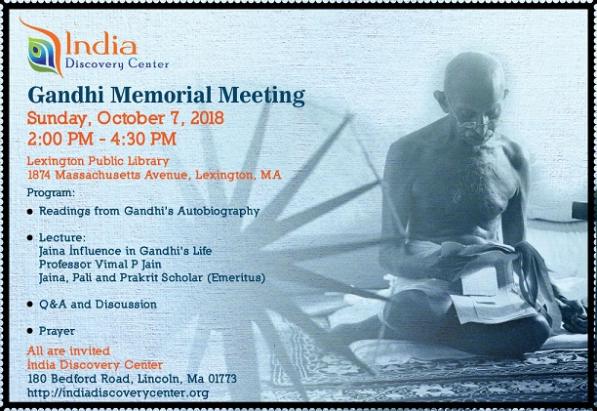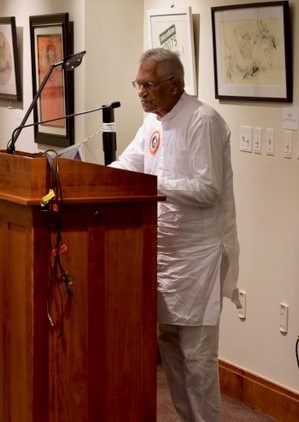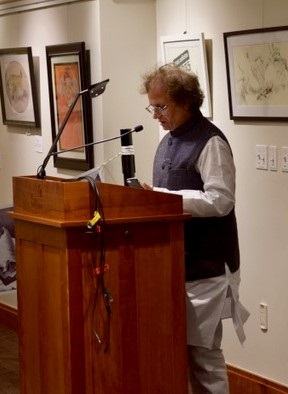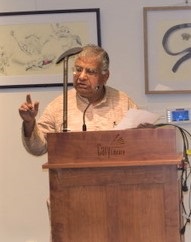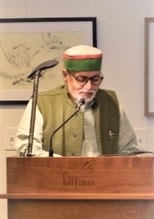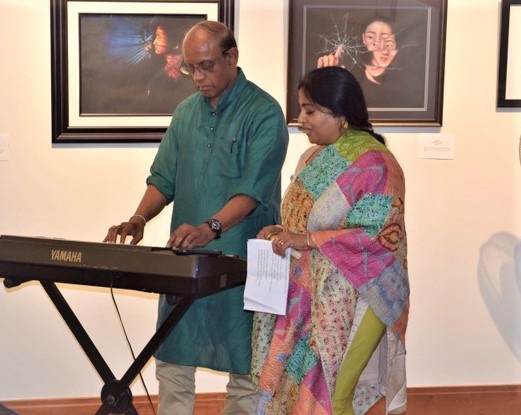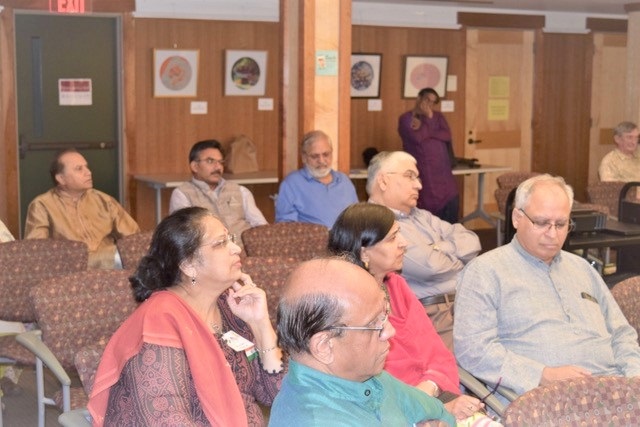Contribute
| Gandhiji – A Man Dedicated To Serve The Humanity |
Bijoy Misra
11/28/2018
In a passionate one-hour lecture on October 7, the octogenarian scholar Professor Vimal Prasad Jain declared that that Mahatma Gandhi was blessed with the gift of his unparalleled faith in humanity and his firm belief in Truth as God. A frail child with average upbringing, Gandhi was deeply attracted to spirituality as practiced by his mother. He developed an utter commitment to truthfulness and a strong dedication to chastity. To the outside world, Gandhi appeared as searching for his dear Rama through his life. He was heard uttering the word “Rama†while succumbing to his death violently. Professor Jain spoke at the 149th birth anniversary meeting organized by India Discovery Center, held at Lexington Public Library. Mr. Chandu Shah presided over the meeting. Prof. Bijoy Misra introduced Prof. Jain who read a well-prepared essay with a title “Jaina influences in Gandhi’s lifeâ€. A special exhibit of pictures of events from Gandhi’s life captured by his grandson Kanu Gandhi was arranged for the meeting. The meeting was attended by the community members and the Faculty and the students from the local schools. Gandhi acknowledged in his Autobiography that three people had the most influence in the development of his views. The first one was Sri Rajchandbhai, a local Jaina businessman whom Gandhi remained in contact most of his life. Sri Rajchandbhai impressed Gandhi with his integrity and clarity of thoughts. More than fifteen years later, Gandhi was exposed to the book “Unto the Last†by John Ruskin of England. The book taught Gandhi about the empowerment of all human beings. Eventually he translated the book in Gujarati with the title “sarvodayaâ€. About the same time, he also read the Russian writer Leo Tolstoy’s book “The kingdom of God is within you.†He marveled at the Tolstoy’s lucid view of morality and spirituality adding to utter confidence in human freedom. Gandhi was not a Jaina from the viewpoint of his birth, neither he considered himself to be. However, he could be considered as a practicing Jaina. An example from Gandhi's life illustrates this wonderful, conflict-resolving principle of relativism, Syadvada. Gandhi's adherence to the vows made in front of his mother and the Jaina Monk Becharji Muni was tested many times. The central tenet of Jainism is Ahimsa (Non-violence) and Gandhi's philosophy rested upon it. He developed a method of political activism called Satyagraha which was wholly based upon truth and non-violence. It has been imperfectly translated as 'non-cooperation' and 'passive resistance.' Gandhi said: "Satyagraha is essentially a weapon of the truthful. A Satyagrahi is pledged to non-violence... ". Gandhi never divided his life into segments. All aspects: personal with wife and children; professional as a fearless fighter for Truth, justice, and equality; as citizen of an empire and as the son of one and the same God; social service as a reformer; a sanitary and hygienic worker; a quack doctor and nurse; a naturopath; an army volunteer and an indefatigable fighter for Independence of Indians and India. Through the single weapon of Truth and non-violence all were indivisibly rolled into one. Gandhi was one simple man, but a Super-Man charged with infinite Spiritual powers. His absolute faith in the God of Truth and spirit for serving humanity transformed him into a fearless person. Power was transferred to India from the British at midnight of August 15, 1947. There were wild celebrations all-round, but Gandhi was wandering among the riot hit, crying people of Noakhali to help calm the massacre there. Gandhi was unable to decide what to do. Most barbarous and heinous acts of violence were being committed on both sides of the Indian border. He had never agreed to the division of the country. He felt as if his own body was being cut in half. He expressed his denial in grave terms but had to swallow the bitter pill. He was totally helpless, left alone to live or die for himself. In December 1947, Gandhi was the loneliest person in the country. On January 13, 1948, he declared a 21 day fast so peace could be restored. His bodily strength deteriorated fast and he was urged to break his fast after 3 days. Then he was assassinated at his own evening prayer meeting on January 30, 1948. Prof. Jain concluded that Gandhi had a lonely journey. The common people supported him, but people in power never understood his vision and conduct. Gandhi’s Rama-rajya, the equal rights to all, and Sarvodaya, the upliftment of all, stayed only as dreams. He succeeded as a moral leader but was far short as a political leader. Gandhi continued to live among the masses and his message became a liberating call to the racial prejudice in the USA and the struggle against apartheid in South Africa. Both struggles resorted to non-violence principles as practiced by Gandhi in his own struggle in liberating India. Various people read excerpts from books on Gandhi and Gandhi’s own writing. Mr. Pankaj J Shah read some beautiful passages from Jawaharlal Nehru’s Discovery of India. Nehru wrote “Politics cease to be just expediency and opportunism, as they have usually been everywhere, and there is a continuous moral tussle preceding thought and action. Expediency… can never be ignored, but it is toned down by other considerations and a longer view of more distant consequences.†Prof. Bal Ram Singh read from Gandhi’s Autobiography and emphasized Gandhi’s vision of local production of food and supplies. It would lead to self-reliance and help develop people-power. He insisted that Gandhi’s thought of village administration “grama rajya†was the right model as established and practiced in India from the olden days. Prof. C. Gopinath read sections from the Autobiography citing Gandhi as a Manager. "The world we must strive to build needs to be based on the concept of genuine social equality in it, the prince and the peasant, the wealthy and the less well-off, the employer and the employee are on the same level. Economic progress cannot mean that few people charge ahead and more and more people are left behind." Gandhi believed that people could not be masters or owners but instead they should be caretakers and trustees. A sound social system discourages exploitation, domination and inequality; and promotes the values of love, truthfulness, cooperation, and solidarity. The last reading was by Prof. Bijoy Misra from the last Chapter of the Autobiography. “To see the universal and all-pervading Spirit of Truth face to face one must be able to love the meanest of creation as oneself. And a man who aspires after that cannot afford to keep out of any field of life. … The experiences and experiments have sustained me and given me great joy. But I know that I have still before me a difficult path to traverse. I must reduce myself to zero. So long as a man does not of his own free will put himself last among his fellow creatures, there is no salvation for him. Ahimsa is the farthest limit of humility.†Ms. Veena Teli ended the afternoon program with the renderings of Gandhi’s popular prayers “Vaishnava Jana to te a kahiye†and “Raghupati Raghava Rajaramâ€. She was accompanied by Mr Pankaj Shah on keyboard and by Mr Prakash Teli on the drums. Mr. Chandu Shah proposed a vote of thanks. Tea was served to all. India Discovery Center is a nonprofit organization based in Lincoln, MA and is dedicated to educational efforts on Culture http://www.indiadiscoverycenter.org
You may also access this article through our web-site http://www.lokvani.com/
